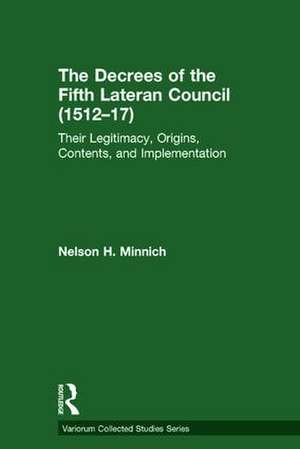The Decrees of the Fifth Lateran Council (1512–17): Their Legitimacy, Origins, Contents, and Implementation: Variorum Collected Studies
Autor Nelson H. Minnichen Limba Engleză Hardback – 24 mar 2016
Din seria Variorum Collected Studies
-
 Preț: 311.18 lei
Preț: 311.18 lei -
 Preț: 310.55 lei
Preț: 310.55 lei -
 Preț: 299.55 lei
Preț: 299.55 lei - 9%
 Preț: 1041.23 lei
Preț: 1041.23 lei -
 Preț: 386.77 lei
Preț: 386.77 lei -
 Preț: 351.48 lei
Preț: 351.48 lei -
 Preț: 313.38 lei
Preț: 313.38 lei -
 Preț: 386.77 lei
Preț: 386.77 lei -
 Preț: 310.22 lei
Preț: 310.22 lei -
 Preț: 258.66 lei
Preț: 258.66 lei -
 Preț: 343.33 lei
Preț: 343.33 lei - 9%
 Preț: 938.44 lei
Preț: 938.44 lei -
 Preț: 311.41 lei
Preț: 311.41 lei - 9%
 Preț: 938.85 lei
Preț: 938.85 lei -
 Preț: 312.75 lei
Preț: 312.75 lei - 9%
 Preț: 936.60 lei
Preț: 936.60 lei -
 Preț: 341.55 lei
Preț: 341.55 lei -
 Preț: 320.00 lei
Preț: 320.00 lei - 34%
 Preț: 764.20 lei
Preț: 764.20 lei - 22%
 Preț: 312.43 lei
Preț: 312.43 lei - 34%
 Preț: 739.65 lei
Preț: 739.65 lei - 34%
 Preț: 764.20 lei
Preț: 764.20 lei - 34%
 Preț: 680.73 lei
Preț: 680.73 lei - 26%
 Preț: 247.40 lei
Preț: 247.40 lei - 34%
 Preț: 485.78 lei
Preț: 485.78 lei - 34%
 Preț: 764.20 lei
Preț: 764.20 lei - 34%
 Preț: 769.51 lei
Preț: 769.51 lei - 34%
 Preț: 764.20 lei
Preț: 764.20 lei - 34%
 Preț: 826.68 lei
Preț: 826.68 lei - 25%
 Preț: 222.32 lei
Preț: 222.32 lei - 25%
 Preț: 225.54 lei
Preț: 225.54 lei - 34%
 Preț: 767.07 lei
Preț: 767.07 lei - 34%
 Preț: 764.20 lei
Preț: 764.20 lei - 34%
 Preț: 736.38 lei
Preț: 736.38 lei - 34%
 Preț: 738.42 lei
Preț: 738.42 lei - 25%
 Preț: 226.52 lei
Preț: 226.52 lei - 33%
 Preț: 491.66 lei
Preț: 491.66 lei - 34%
 Preț: 485.78 lei
Preț: 485.78 lei - 34%
 Preț: 485.78 lei
Preț: 485.78 lei - 34%
 Preț: 764.20 lei
Preț: 764.20 lei - 34%
 Preț: 736.38 lei
Preț: 736.38 lei - 31%
 Preț: 473.94 lei
Preț: 473.94 lei - 18%
 Preț: 807.71 lei
Preț: 807.71 lei - 34%
 Preț: 764.20 lei
Preț: 764.20 lei - 34%
 Preț: 764.20 lei
Preț: 764.20 lei - 34%
 Preț: 764.20 lei
Preț: 764.20 lei - 51%
 Preț: 485.78 lei
Preț: 485.78 lei - 34%
 Preț: 485.78 lei
Preț: 485.78 lei - 34%
 Preț: 769.10 lei
Preț: 769.10 lei - 34%
 Preț: 766.65 lei
Preț: 766.65 lei
Preț: 822.76 lei
Preț vechi: 1241.04 lei
-34% Nou
Puncte Express: 1234
Preț estimativ în valută:
157.45€ • 163.39$ • 131.60£
157.45€ • 163.39$ • 131.60£
Carte tipărită la comandă
Livrare economică 17-31 martie
Preluare comenzi: 021 569.72.76
Specificații
ISBN-13: 9781472484642
ISBN-10: 1472484649
Pagini: 346
Dimensiuni: 156 x 234 x 26 mm
Greutate: 0.61 kg
Ediția:1
Editura: Taylor & Francis
Colecția Routledge
Seria Variorum Collected Studies
Locul publicării:Oxford, United Kingdom
ISBN-10: 1472484649
Pagini: 346
Dimensiuni: 156 x 234 x 26 mm
Greutate: 0.61 kg
Ediția:1
Editura: Taylor & Francis
Colecția Routledge
Seria Variorum Collected Studies
Locul publicării:Oxford, United Kingdom
Cuprins
Preface; What is an Ecumenical Council? The 16th-century teachings of the theologian Roberto Bellarmino and the Canonist Domenico Giacobazzi; The legitimacy of the Fifth Lateran Council (1512-17); The Fifth Lateran Council as a theatre for demonstrating papal power; Julius II and Leo X as presidents of the Fifth Lateran Council (1512-1517); Session IX: origins of decree Supernae dispositionis arbitrio (1514) - The Reform Proposals (1513) of Stefano Taleazzi for the Fifth Lateran Council (1512-17); Session X: decree Inter multiplices on credit organization (1515) - The decree Inter multiplices of Lateran V on Montes pietatis; Session X: decree Inter sollicitudines on preventive censorship (1515) - The Fifth Lateran Council and preventive censorship of printed books; Session XI: decree Pastor Aeternus on papal control of councils (1516) - Luther, Cajetan, and Pastor Aeternus (1516) of Lateran V on conciliar authority; Session XI: decree Dum intra mentis arcana on religious and their privileges - Egidio Antonini da Viterbo, the reform of religious orders, and the Fifth Lateran Council (1512-1517); Session XII: Decree Constituti iuxta verbum on closing the council - The closing of the Fifth Lateran Council (1512-17); The implementation of Lateran V by the Milanese councils of San Carlo Borromeo; Leo X: success or failure; Index.
Notă biografică
Nelson H. Minnich is Professor in the Department of History, The Catholic University of America, USA.
Descriere
The Fifth Lateran Council (1512-17), whose 500th anniversary is being commemorated, has left a legacy little studied by scholars. The council’s status as an ecumenical council was questioned by its opponents and its decrees ignored, resisted, or only slowly implemented. This new collection of articles by Nelson H. Minnich examines: what is an ecumenical council, the reasons Lateran V qualifies as such, the roles the popes played in it, the council as a theater for demonstrating papal power, what was proposed as its agenda, what decrees were issued, and to what extent they were implemented.
